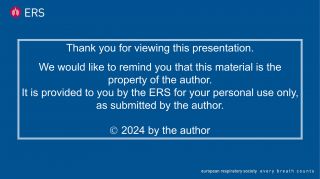7 August, 2024 | Online
16:00-17:00 CEST
Chairs: Dr Sara Cuevas Ocaña (Nottingham, United Kingdom), Dr David Drummond (Paris, France)
Speakers: Dr Michael Gerckens (München, Germany), Dr Vitalii Poberezhets (Vinnytsia, Ukraine)
This webinar is one of a series of activities linked to the upcoming ERS Congress theme 'Humans and machines: getting the balance right'. The content of this webinar will complement the content of the Congress programme.
Overview
Data science and artificial intelligence are experiencing huge developments, enabling great benefits and advances in many fields. It is important for our community of respiratory experts to take advantage of these recent developments, in the clinic, in research, and in medical practice.
Educational aims
During this session, the speakers and the moderators will ensure that basic concepts such data science and artificial intelligence are made clear, that recent advancements are highlighted and most importantly, that there are clear explications of how these new technologies can have a place for every respiratory professional, regardless of their discipline.
The participants will either gain deeper understanding on the topic or learn new ways in which they can incorporate data science and artificial intelligence into their daily tasks to address respiratory issues.
Topics
- Data science in the context of respiratory medicine - Michael Gerckens
- Low and non-coding AI tools for every respiratory professional - Vitalii Poberezhets
Target audience
- Respiratory professionals
- Scientists
- Researchers
- Allied professionals
- Clinicians
Learning outcomes
Following this webinar, participants will be able to:
- Identify artificial intelligence tools that can help with their daily tasks, regardless of their previous experience with coding.
- Better understand how to analyse and/or interpret data science studies.
- Have a clearer idea of how to incorporate new technologies into their research and/or clinical practice.
CME credit
An application for accreditation of this webinar has been made to the European Board for Accreditation in Pneumology (EBAP) for 1 CME credit per 1-hour attendance. If accredited, the CME credit will be granted upon attendance of at least 60 minutes during the live webinar only.
What is a webinar?
A webinar closely simulates a lecture-based teaching experience. The speaker can interact with the audience, just as in a classroom setting. During the webinar, you will be asked to share your opinion on issues related to the topic using interactive polls.
All participants will be able to hear the lecturer and see the slides throughout the presentation. As a participant you will be able to pose questions or discuss ideas with the other participants via the text chat facility and the speaker will respond to the questions via the microphone.
Login guidelines
More information will be communicated in due course.
- Please log in to the webinar 20 minutes before it is scheduled to commence. If you have any technical difficulties whilst trying to log in or during the session please contact e-learning@ersnet.org.
- Check Central European Time.
- To achieve the best quality, we recommend to avoid downloading anything from the internet during your connection to the lecture and stopping all other programmes.
- Please also ensure that your audio settings are not set to mute and adjust the volume to a comfortable level.

